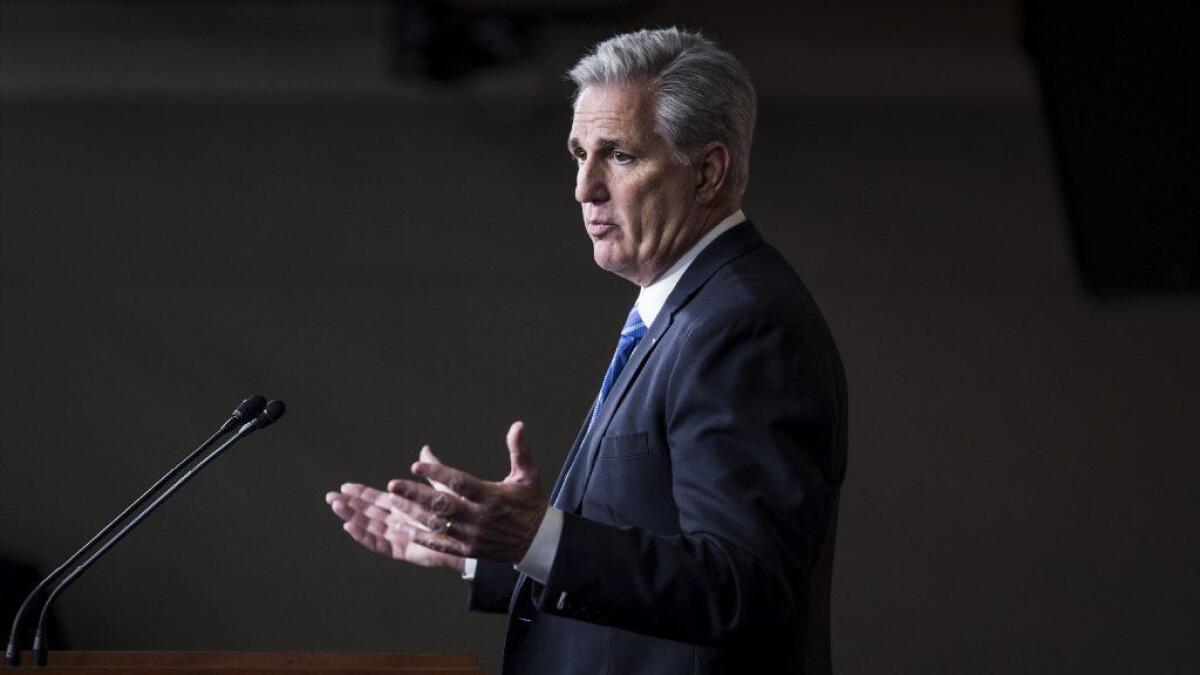New far-reaching abortion bans too extreme for some Republican leaders

Reporting from Washington — Republican leaders have begun distancing themselves from new, far-reaching state abortion restrictions that don’t allow exceptions in the cases of rape or incest.
The Republican leaders in both the House and Senate expressed reservations about the sweeping bans, stressing their support for exceptions in the cases of rape and incest.
“I believe in exceptions for rape, incest and life of the mother, and that’s what I’ve voted on,” House Minority Leader Kevin McCarthy (R-Bakersfield) said Thursday.
Alabama this week approved a law to ban abortion at any stage of pregnancy,with no exceptions for rape or incest. That came on the heels of laws in other states — including Ohio, Kentucky and Mississippi — that ban the procedure when a fetal heartbeat is detected, at about six weeks of pregnancy, also with no exceptions for rape or incest. All of the legislation includes exceptions for abortions to preserve a woman’s life.
Republican lawmakers in Alabama and elsewhere have said their goal is to give the Supreme Court’s conservative majority an opportunity to reverse the 1973 Roe vs. Wade decision, which legalized abortion nationwide.
Supreme Court is not eager to overturn Roe vs. Wade — at least not soon »
The bans have activated the 2020 Democratic presidential candidates and other prominent Democrats in opposition. But some Republicans in Washington also say they oppose new abortion restrictions that don’t allow for the rape and incest exceptions.
Senate Majority Leader Mitch McConnell of Kentucky, whose state recently banned abortion when a fetal heartbeat is detected with no exceptions for rape and incest, also said he supported the exceptions.
“Leader McConnell’s record has been clear for decades on this issue,” said McConnell spokesman Doug Andres. “He opposes abortion except in the instance of rape, incest, or the life of the mother in is danger.”
Even Alabama’s GOP senator said he supports the three traditional exceptions.
Sen. Richard C. Shelby said he “always supported” exceptions for rape and incest.
“I’m not down there,” he said of his home state’s most recent law.
The latest antiabortion legislation represents a new front in the abortion debate. Nationally, Republicans have supported exceptions for all three circumstances for many years.
Sen. Thom Tillis (R-N.C.), who is up for reelection this year, also said he opposed sweeping bans. “Of course there needs to be” exceptions, he said.
Several Republican senators, however, refused to weigh in on the issue.
“I don’t really have a response,” said Sen. Shelly Moore Capito (R-W.Va.), who is also up for reelection next year. “I’m going to have to digest what’s going on.”
“States don’t need to hear from me on what they’re going to do,” said Sen. John Barrasso (R-Wyo.). “That’s how I always felt when I was in the state Senate.”
And some Republicans embraced the bills.
“If you think it is a human life, therefore a child of God, it really shouldn’t matter how it was conceived,” said Sen. Roger Wicker (R-Miss.). “I can just tell you there are millions of people out there who believe that. Obviously, millions of people in New York that see it just the other way.”
New York state this year approved a law that expanded access to abortion. The state approved abortion after the 24th week of pregnancy to preserve the life or health of the mother.
That legislation came shortly before Virginia Gov. Ralph Northam, a Democrat, suggested in a widely circulated radio clip that a baby born after an attempted abortion would only be “kept comfortable” and not necessarily resuscitated.
Both the New York law and Northam’s comments — which fellow abortion rights supporters opposed — aroused opponents of abortion. President Trump has frequently cited Northam’s comments at events with supporters.
Abortion rights supporters have also brought the issue to the forefront ahead of the 2020 presidential contest. Sen. Kirsten Gillibrand (D-N.Y.) has pledged to appoint only Supreme Court justices who support the Roe decision. And several Democratic candidates have come out in opposition to the Alabama and Georgia laws in recent days.
The laws in all four of the states — Alabama, Kentucky, Mississippi and Ohio — are being challenged in court or have already been struck down.
Missouri’s state Senate approved a bill Thursday to prohibit abortion at eight weeks of pregnancy with no exceptions for rape or incest. It is expected to be taken up by the state’s House.
More stories from Jennifer Haberkorn »
More to Read
Get the L.A. Times Politics newsletter
Deeply reported insights into legislation, politics and policy from Sacramento, Washington and beyond. In your inbox three times per week.
You may occasionally receive promotional content from the Los Angeles Times.











